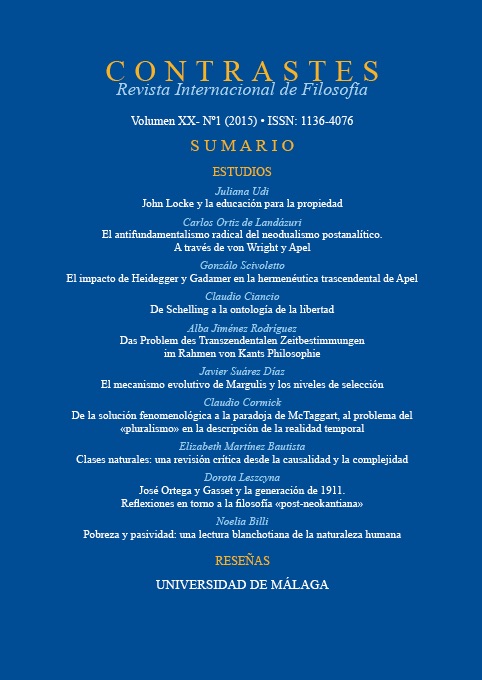From the phenomenological solution to McTaggart’s paradox to the problem of pluralism in the description of temporal reality
DOI:
https://doi.org/10.24310/Contrastescontrastes.v20i1.2299Keywords:
Time, Merleau-Ponty, McTaggart, Dummett, SmithAbstract
In this paper we attempt to continue the proposal of a solution to McTaggart’s paradox on the basis of a return to a line of analysis traceable back to Dummett, and its implementation with certain tenets of Merleau-Pontyan phenomenology. With this aim, we have to deepen the positions of the author of Truth and other enigmas which point towards an objection against one “complete description” of reality and favour, on the contrary, a plurality of “maximal descriptions”. Our attempt must not, however, adopt a “pluralism” which can be targeted by Nicholas Smith’s objections, to whom, in turn, we reply by turning to the phenomenological notion of “synthesis of transition”. We conclude that the “pluralism” of temporal descriptions that allows us to escape from McTaggart’s paradox is not incompatible with the requisite of “compossibility” laid out by Smith.Downloads
Metrics
Publication Facts
Reviewer profiles N/A
Author statements
Indexed in
-
—
- Academic society
- N/A
- Publisher
- Universidad de Málaga
Downloads
Published
How to Cite
Issue
Section
License
This journal provides immediate free access to its content under the principle of making research freely available to the public. All content published in Contrastes. Revista Internacional de Filosofía, are subject to the Creative Commons Attribution-NonCommercial-ShareAlike 4.0 license whose full text can be found at <http://creativecommons.org/licenses/by-nc-sa/4.0>
It is the responsibility of the authors to obtain the necessary permissions of the images that are subject to copyright.
Authors whose contributions are accepted for publication in this journal will retain the non-exclusive right to use their contributions for academic, research and educational purposes, including self-archiving or repository in open access repositories of any kind.
The electronic edition of this magazine is edited by the Editorial Service of the University of Malaga (Uma Editorial), being necessary to cite the origin in any partial or total reproduction.










5.png)
